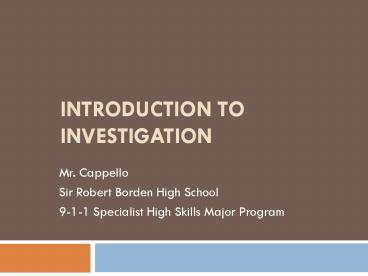Introduction to Investigation - PowerPoint PPT Presentation
Title:
Introduction to Investigation
Description:
INTRODUCTION TO INVESTIGATION ... Investigare is based on another ... Decoy operations Repeat offender programs Undercover drug operations Overt vs. Covert ... – PowerPoint PPT presentation
Number of Views:195
Avg rating:3.0/5.0
Title: Introduction to Investigation
1
Introduction to Investigation
- Mr. Cappello
- Sir Robert Borden High School
- 9-1-1 Specialist High Skills Major Program
2
Overview
- An Overview of Investigating
- 1. Defining an Investigation
- 2. Practices to follow during an Investigation
- 3. Art or Science?
- Types of Investigations
- 1. Criminal-Non criminal
- 2. Reactive- Proactive
- 3. Overt-Covert
- The Investigating Questions
- 1. Patterns, Leads, Tips, and Theories
3
Investigation Defined
- Investigation the systematic and thorough
examination or inquiry into something or someone
(the collection of facts or information) and the
recording of this examination or inquiry in a
report.
- The word investigate can be traced back to the
Latin word investigare, meaning "to search into.
- Investigare is based on another Latin word,
vestigare, meaning "to track or to trace."
4
Investigation, Art or Science?
- Both!
- Investigating is a science because there are
certain rules that should be followed to conduct
a successful investigation. Pure sciences and
applied sciences play an increasingly important
role in the investigating process. - Investigating is an art because it depends on
the human skills of the investigator, including
interpersonal communication and creativity.
5
Practices to follow during an Investigation
- A logical sequence must be followed
- Real, physical evidence must be legally obtained
- Real, physical evidence must be properly stored
and preserved. - Witnesses must be identified, interviewed, and
- prepared for any potential or actual
litigation - Leads must be developed.
- Reports and documentation must be collected
- Information must be accurately and completely
recorded. - Evidence collected must correlate to
- the claim cause of action, or offence charged
6
Criminal vs. Non Criminal
- Criminal jurisdiction of police/government
agencies. - Non-criminal investigations involve the
investigation - of non-criminal incidents or events.
- Non-criminal investigations may be conducted by
the public, police or private investigators. The
main difference between non-criminal
investigations by the public, police and by
private investigators is that police
investigations are funded by the government,
whereas private investigations are paid for by
individual clients or businesses.
7
Reactive Investigation vs. Proactive
Investigation
- Reactive investigation is one that is instigated
on the basis of a complaint registered by a
victim or client. For example, a person is the
victim of a robbery and reports this robbery to
the police-the police then conduct a reactive
investigation. - 2 Types of reactive The preliminary
investigation and the follow-up or latent
investigation. The preliminary investigation is
the initial inquiry into a reported crime and is
generally conducted by a uniformed patrol
officer.
8
Reactive Investigation vs. Proactive
Investigation
- Proactive investigations are investigations
conducted by the police based on their own
initiative. - The proactive investigation is
- Designed to catch a criminal in the act of
committing a crime, rather than waiting until a
citizen reports a crime. The three main types of
proactive investigations are - Decoy operations
- Repeat offender programs
- Undercover drug operations
9
Overt vs. Covert Investigation
- An overt investigation is one that is conducted
openly-investigators do not try to hide their
true identity or hide the fact that they are
conducting the investigation. Most reactive
investigations are overt. - A covert investigation, on the other hand, is
conducted in secret-the investigator tries to
hide his identity and the fact that he is
conducting an investigation. Generally proactive
investigations are covert. - Covert investigations are more commonly called
undercover investigations.
10
Basic Police Investigation
- 5 tasks during the preliminary reactive
investigation by a patrol officer - Conducts a preliminary search of the area of
crime to determine if the suspect is still
present - Renders first aid to any injured parties,
- Detains, separates, and interviews any possible
suspects or witnesses - Restricts access to the area where the crime was
committed to prevent the destruction of evidence.
- Prepares the first written report of the crime,
which is generally called an incident or
complaint report.
11
Patterns Leads
- A pattern is a series of similarities that may
link particular cases or indicate that the same
person is committing a series of crimes. - Leads are clues or pieces of information that aid
in the progress of an investigation. Leads can be
physical evidence or information received by
witnesses or other persons or through
surveillances, undercover investigations, and
record searches. A lead is anything that can
assist an investigator in resolving an
investigation.
12
Tips Theories
- Tips are leads provided by citizens that aid in
the progress of an investigation. Generally tips
involve the identity of the suspect (eg. Crime
Stoppers) - Theories are beliefs regarding the case based on
evidence, patterns, leads, tips, and other
information developed or uncovered in a case.
Theories are important because they direct the
investigation. Investigators have to be very
careful in building theories about a case,
because if the theory is wrong, it may lead them
in the wrong direction.































